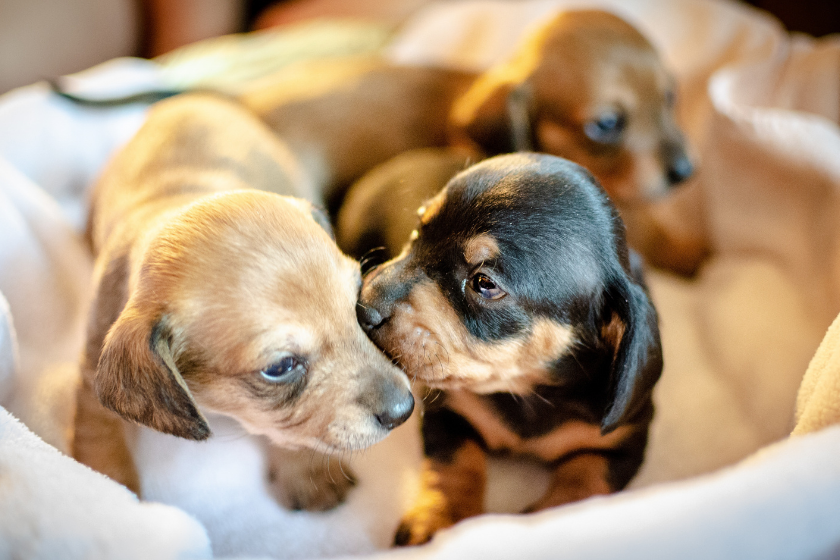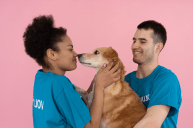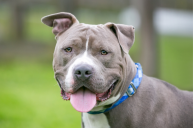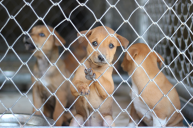Trying to avoid puppy mills? Here is how to find a responsible breeder.
Pet parents may opt for a purebred dog for many reasons. Some want to participate in dog shows, and others want to know their pup's lineage. Other dog parents prefer to get their pups from a dog breeder or have a specific breed in mind for their families and lifestyle. Regardless of why you're bringing one home, you want to ensure that you adopt from a good breeder. So, how do you go about finding a responsible breeder?
What Makes A Good Breeder?

According to the American Kennel Club, a good breeder understands the dog breed and its needs. A responsible breeder finds out as much as they can about their dog's lineage and can answer your questions about the puppy's parents and grandparents. Many breeders will trace their dog's lineage back even further as some are registered with the AKC or their breed clubs.
A good breeder will screen their dogs for any health problems, and they will be upfront about the health testing results. Some breeds are known for specific health issues, and knowledgeable breeders will answer all of your questions. The right breeder will also make sure the puppy does not leave their kennel or home before being cleared by a veterinarian and has had its first round of vaccinations and the proper initial socialization. Puppies need to spend plenty of time with their mothers, so they learn how to interact properly, and a responsible breeder will not rip the puppy away from their mother too soon.
A good dog breeder will also not hesitate to let you come to their breeding facility, often the breeder's home. Visiting where the puppies live before they come home will give you an idea of how the breeder treats their dogs and if one of their pups will be a good fit for your home. Many breeders will also want to talk to you to see if you will be providing a good home for their pups.
The ASPCA classifies a responsible breeder as one who does not follow standards set by commercial breeders, pet stores, brokers, and other harmful dog breeding practices. To the ASPCA, breeders who plan their litters and search for the best new homes for them are some of the most reputable breeders. They also want the breeders to:
- Make sure pups have clean water, good dog food, and a proper home
- Offer proper exercise, socialization, and veterinary care
- Practice proper grooming
- Care for the momma dog and father, including proper feeding and care
- Make sure the new puppy home is safe and loving
- Puppies go to their homes at least after 10-12 weeks old
The ASPCA also says that a breeder should answer questions and be transparent with the potential buyers.
Finding Reputable Breeders

Before you get a new dog, you want to do plenty of research on the breed of dog before you go looking for a breeder. That way, you know what you are getting into, the level of commitment your new puppy will take, and their requirements as an adult dog. Check your local breed clubs for referrals to quality breeders when looking for a breeder. These clubs don't usually hand out breeder referrals for any breeders. Instead, they keep to a small list of trusted breeders since it is their reputation of the line, too. Breed clubs want the process of finding a new family pet to be a positive experience.
Another place to find a responsible breeder is on the AKC's website. They have a Breeder of Merit Program for purebred dog breeders with a list of specific qualifications to join the program. The AKC says that the breeders are considered "the most conscientious and most committed breeders." To become a Breeder of Merit, breeders need to show at a minimum:
- Certified health screens, per AKC health testing requirements for purebred puppies
- Health testing for sires and dams of litters
- Commit to all puppies being registered
- AKC member for five years
- Active AKC club membership
The AKC also has a Bred with HEART program to ensure breeders follow specific standards and ensure that puppies come from and go to loving homes. When you find a breeder, do not be afraid to ask lots of questions about the dog breed, their practices, and any other information you want to know about the puppies, their parents, or grandparents.
If you know what type of dog you want, you can also consult with breed-specific rescue groups. They often have puppies available to adopt to good homes.
Breeder Adoption Process

RELATED: How Much Do Dalmatian Puppies Cost?
Most breeders will place you on a waiting list once their female dog is pregnant. Those on the waiting list will get to meet the litter to find the right puppy for their home — This also allows you to see the puppy's parents and where they live. Of course, you will also observe how they play with their littermates. You will place a deposit, determined by the breeder, to reserve your puppy. When they are ready to come home, you will pay the remainder.
A reputable breeder will have you come to see the pups a couple of times before they get to go home with you and will get them screened by a vet with their first round of vaccinations. Many breeders leave it up to you to spay and neuter your new puppy, especially with AKC litters.
Why Choose Breeders Over Rescues?

While your local humane society may have plenty of puppies, you may want a purebred puppy for several reasons. First, when you buy a puppy from a breeder, you can ensure their lineage health history, and there is comfort in knowing exactly where the dog came from.
If you are adopting from a rescue, it can be hard to know where the dog came from, its background, and health history. Also, puppies go very quickly when they are put up for adoption at rescues, and there is no guarantee that you will get the dog you want. Some rescue puppies also do not have proper socialization and have not spent enough time with their mothers, so they may not make good family pets. Rescues also put age limits on who can adopt and what age the children in the household can be. If you have children under five or under ten in some cases, you may not be eligible to adopt from a rescue.
You also may not know exactly what breed the dog is, which can be a blessing and a curse. Mixed breed dogs tend to have fewer health issues, but you do not know what personality traits and other breed characteristics there may be in the mix. Some traits, like a high prey drive, may need to be avoided if you have smaller pets in the home already.
Getting a puppy from a responsible breeder is one way to ensure that you get a family-friendly puppy that fits in with your home and lifestyle. You also ensure that you start their training properly since they are a blank slate.
Did you get your dog from a breeder? Tell us on our Wide Open Pets Facebook page.




